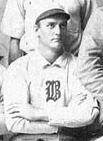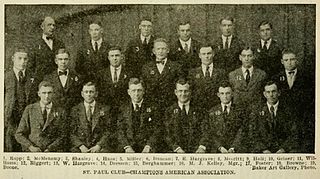See also
| This disambiguation page lists articles associated with the title Baltimore Oriole. If an internal link led you here, you may wish to change the link to point directly to the intended article. |
The Baltimore oriole is a bird species.
Baltimore oriole(s) may also refer to:
In sports, Baltimore Orioles most commonly refers to a Major League Baseball team of the American League since 1954; previously the St. Louis Browns (1902–1953), and old Milwaukee Brewers (1894–1901).
Other teams named the Baltimore Orioles include:
| This disambiguation page lists articles associated with the title Baltimore Oriole. If an internal link led you here, you may wish to change the link to point directly to the intended article. |

The American League of Professional Baseball Clubs, or simply the American League (AL), is one of two leagues that make up Major League Baseball (MLB) in the United States and Canada. It developed from the Western League, a minor league based in the Great Lakes states, which eventually aspired to major league status. It is sometimes called the Junior Circuit because it claimed Major League status for the 1901 season, 25 years after the formation of the National League.

Lloyd Street Grounds was a baseball park located in Milwaukee, Wisconsin. It was used by two different professional baseball clubs during 1895–1903.

Wilbert Robinson, nicknamed "Uncle Robbie", was an American catcher, coach and manager in Major League Baseball. He was inducted into the Baseball Hall of Fame in 1945.

The Baltimore Orioles were a 19th-century American Association and later National League of Professional Base Ball Clubs baseball team from 1882 to 1899. The early ball club, which featured numerous future Hall of Famers, finished in first place three consecutive years (1894–1895–1896) and won the "Temple Cup" national championship series in 1896 and 1897. Despite their success, the dominant Orioles were contracted out of the League after the 1899 season, when the N.L. reduced its number of teams and franchises from 12 to 8, with a list of teams and cities limited to just the northeastern United States which endured for the next half-century until 1952 and 1954. No franchises were located any further west than St. Louis and no further south than Washington, D.C.. This controversial action resulting in the elevation of the former minor league level Western League of Professional Baseball Clubs by leaders such as Ban Johnson (1864-1931), into a newly reorganized, upgraded American League of Professional Base Ball Clubs in 1900, and declaring itself a "major league" beginning play during the 1901 season of which the new reorganized Baltimore Orioles were a prominent charter member for its first two seasons which "waged war" on the elder "Nationals".

Samuel James Tilden "Jimmy" Sheckard was an American left fielder and left-handed leadoff hitter in Major League Baseball who played for the Brooklyn Bridegrooms/Superbas, Baltimore Orioles (NL) (1899), Baltimore Orioles (AL) (1902), Chicago Cubs (1906–12), St. Louis Cardinals (1913) and Cincinnati Reds (1913).

Joseph James Kelley was an American left fielder in Major League Baseball (MLB) who starred in the outfield of the Baltimore Orioles teams of the 1890s. Making up the nucleus of the Orioles along with John McGraw, Willie Keeler, and Hughie Jennings, Kelley received the nickname "Kingpin of the Orioles".
Oriole or Orioles may refer to:
The Western League of Professional Baseball Clubs, also called the Western League, was a minor league baseball league founded on February 11, 1885, and focused in the Midwestern United States.
The city of Baltimore, Maryland has been home to two minor league baseball teams called the "Baltimore Orioles", besides the four major league baseball teams,.
The Temple Cup was a cup awarded to the winner of a best-of-seven, post-season play-offs championship tournament for American professional baseball for the National League of Professional Baseball Clubs and awarded four times from 1894 to 1897. The 30-inch-high silver cup cost $800, and was donated by coal, citrus, and lumber baron William Chase Temple (1862-1917), a part-owner of the Pittsburgh Pirates at the time.

Frank R. Kitson was an American baseball pitcher.

James Jay Hughes was an American Major League Baseball pitcher, who played four seasons from 1898 to 1902.

Dennis Lawrence "Dan" McGann was an American professional baseball first baseman and second baseman. He played in Major League Baseball (MLB) for the Boston Beaneaters (1896), Baltimore Orioles (1898), Brooklyn Superbas (1899), Washington Senators (1899), St. Louis Cardinals (1900–1901), Baltimore Orioles (1902), New York Giants (1902–1907), and Boston Doves (1908). He was also a member of the 1905 World Series champions.

Frank Edward Dillon, known in later years as Pop Dillon, was an American baseball player and manager. He played 22 seasons in professional baseball from 1894 to 1915, including five years in Major League Baseball, as a first baseman with the Pittsburgh Pirates (1899–1900), Detroit Tigers (1901–1902), Baltimore Orioles (1902), and Brooklyn Superbas (1904). He appeared in 312 major league games and compiled a .252 batting average. He was later a player and manager for the Los Angeles Angels of the Pacific Coast League (PCL) from 1903 to 1915. He led the Angels to PCL pennants in 1903, 1905, 1907 and 1908.
This is a summary of the evolution of nicknames of the current professional Major League Baseball teams in the National League and subsequent rival American League, and also of selected former major and minor league teams whose nicknames were influential, long-lasting, or both. The sources of the nicknames included club names, team colors, and city symbols. The nicknames have sometimes been dubbed by the media, other times through conscious advertising marketing by the team, or sometimes a little of both.

John J. Cronin was a Major League Baseball (MLB) pitcher. He played professionally from 1895 through 1912. His MLB career included stints with the Brooklyn Grooms (1895), Pittsburgh Pirates (1898), Cincinnati Reds (1899), Detroit Tigers (1901–1902), Baltimore Orioles (1902), New York Giants (1902–1903), and Brooklyn Superbas (1904).

George J. "Doc" Yeager was a professional baseball player. He played all or part of six seasons in Major League Baseball, primarily as a catcher. He played for the Boston Beaneaters from 1896 to 1899, the Cleveland Blues in 1901, the Pittsburgh Pirates in 1901, the New York Giants in 1902, and the Baltimore Orioles in 1902. During his career, he was measured at 5 ft 10 in (1.78 m) and weighing 190 lbs.

Lewis DeWitt "Snake" Wiltse was a pitcher in Major League Baseball. He played for the Pittsburgh Pirates, Philadelphia Athletics, Baltimore Orioles, and New York Highlanders from 1901 to 1903. His brother was fellow major league pitcher George "Hooks" Wiltse.

Oriole Park is the name of several former major league and minor league baseball parks in Baltimore, Maryland.

The St. Paul Saints were a baseball team who represented St. Paul, Minnesota in the Western League from 1894 to 1899 and the American Association from 1902 to 1960. They originated as the Sioux City franchise in the Western League which reorganized itself in November, 1893, with Ban Johnson as President. Johnson, a Cincinnati-based reporter, had been recommended by his friend Charles Comiskey, former major league star with the St. Louis Browns in the 1880s, who was then managing the Cincinnati Reds. After the 1894 season, when Comiskey's contract with the Reds was up, he decided to take his chances at ownership. He bought the Sioux City team and transferred it to St. Paul, where it enjoyed some success over the next 5 seasons. The 1920, 1922, and 1923 Saints were recognized as being among the 100 greatest minor league teams of all time.